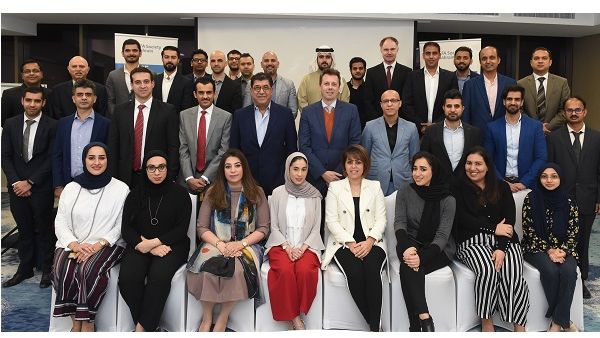KPMG in Bahrain Discusses the Impact of Value-Added Tax on the Economy

KPMG in Bahrain participated in a panel discussion yesterday, organized by the CFA Society Bahrain to discuss the introduction of Value-added Tax (VAT) in the Kingdom. Senior accounting and finance professionals from banks, insurance companies, and large corporations obtained from KPMG experts further valuable insight on the impact of the proposed new tax system on their businesses and the impact it would have on the overall economic landscape in Bahrain.
Speaking at the event, Jamal Fakhro, Managing Partner of KPMG in Bahrain, explained that the introduction of VAT at a 5 percent rate would lead to changes for the local business landscape. “Bahrain has always been known as a tax-free economy although levies and charges have always been present. The introduction of a consumption tax on most goods and services will inevitably require an updated approach to the way of interacting with business partners and final consumers. There is continuous risk for business disruption and reputational damage if VAT is not managed effectively prior to introduction and beyond go-live. It is vital that organizations utilize the time leading towards VAT roll out, expected by the second half of 2018, to evaluate the impact of VAT on their operations and take all measures to ensure a smooth roll-into VAT throughout the whole services’ supply chain.” Fakhro added.
Philippe Norre, Head of Indirect Taxes at KPMG in Bahrain, elaborated on the complexity of managing VAT throughout the entire commercial chain, including business transactions inside and outside of Bahrain and assimilated hidden transactions. “Managing accounts and monitoring VAT in all transactions is not an easy task but can be handled efficiently with a tailored Control Framework and specific VAT procedures and processes that are adhered to by all stakeholders in the business, and not just Finance. Having a technology-enabled processes, whether by upgrading existing Enterprise Resource Planning (ERP) systems or carefully rolling out add-on tools embedded in the overall digital strategy of the organization, is a must-do to ensure accurate tax reporting, avoid financial penalties and navigate government requirements” he commented.
The workshop held at the Wyndham hotel on Saturday, 20 January 2018, as part of KPMG in Bahrain’s ongoing efforts to participate in interactive discussions with the businesses community to update them on new developments that impact financial reporting.
Background Information
KPMG
Through helping other organizations mitigate risks and grasp opportunities, we can drive positive, sustainable change for clients, our people and society at large.
KPMG member firms operate in 153 countries, collectively employing more than 207,000 people, serving the needs of business, governments, public-sector agencies, not-for-profits and through member firms' audit and assurance practices, the capital markets. KPMG is committed to quality and service excellence in all that we do, bringing our best to clients and earning the public's trust through our actions and behaviours both professionally and personally.






